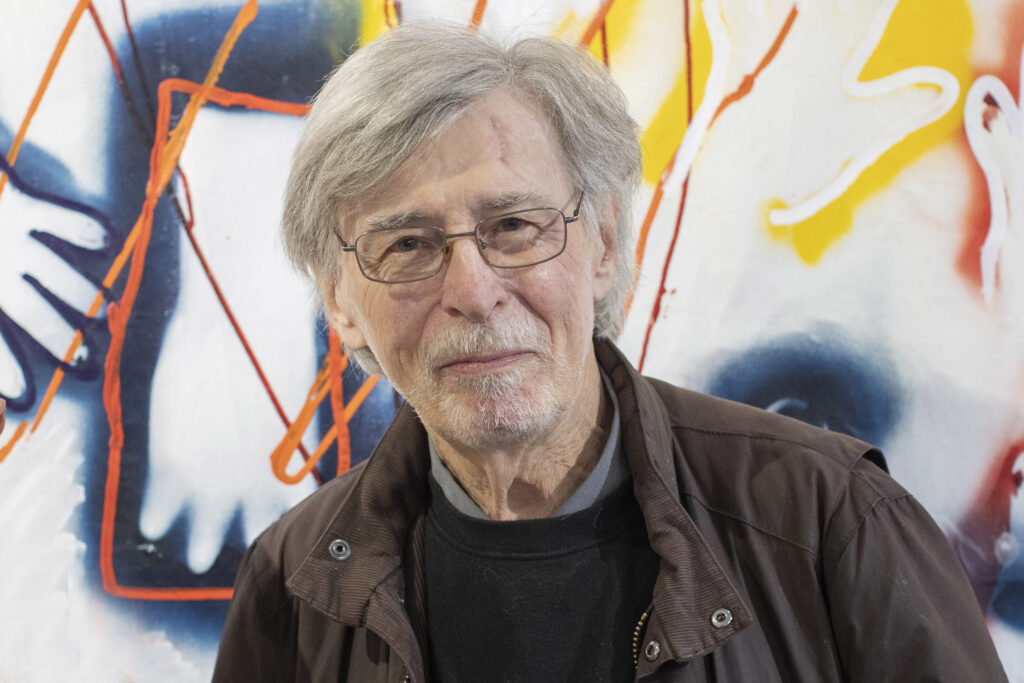The brainers

Hervé Fischer – Multimedia artist and philosopher
A multimedia artist-philosopher, Hervé Fischer initiated sociological art and today practices tweet art and tweet philosophy. His work has been shown in numerous international museums and biennials. The Centre Georges Pompidou devoted a retrospective to him, Hervé Fischer et l’art sociologique, in 2017. A digital pioneer in Quebec, in 1985 he founded the Cité des arts et des nouvelles technologies de Montréal, the first Café électronique in Canada, the International Multimedia Market, the International Federation of Multimedia Associations, the Téléscience festival and Science pour tous. His research focuses on art, the sociology of color, the digital, social imaginaries and hyperhumanism. He designed the Quebec medialab Hexagram. His publications include Théorie de l’art sociologique (1977), L’Histoire de l’art est terminée (1981), Le choc du numérique (2002), CyberProméthée, l’instinct de puissance (2003), La planète hyper, de la pensée linéaire à la pensée en arabesque (2004), La société sur le divan (2007), L’Avenir de l’art (2010), La divergence du futur (2014), La pensée magique du Net (2014), Market Art (2016), Les couleurs de l’Occident. From Prehistory to the 21st Century (2019), The Hyperhumanist Age. Pour une éthique planétaire (2019). He founded the International Society of Mythanalysis.
This brainer takes part in round-table discussions, offers improvisation sessions and the following solo talks:
What is the energy of progress?
Progress is a very broad concept. I’m talking here about collective progress, a myth established by the French Revolution, both human, summed up by the Declaration of Universal Human Rights and the trilogy Liberté, Égalité, Fraternité, and technoscientific, formulated by Condorcet, Auguste Comte, which has governed us since the start of the Industrial Revolution, notably the uses of the steam engine, electricity, nuclear, now quantum, fossil and renewable energies, in short based on the progress of energy itself, decarbonized and abundant. This progress in energy is as old as the world itself, like the wind and fire that Prometheus stole from Zeus and gave to mankind, for which he was cruelly punished. It’s clear that fire has always been energy, the driving force behind Homo fabricator’s technological progress, but it’s also linked to punishment, evil and danger, even today. We need it, and at the same time it threatens us. How can we manage this increasingly powerful threat in a beneficial way? Keeping it away from us is today’s big problem. We’re looking to the energy transition for a difficult but sustainable solution. The challenge is both practical in terms of use and mythical in terms of the destiny of the human race, which could destroy itself.
Posthumanism or Hyperhumanism?
Mythoanalysis postulates that everything that is real is fabulist, everything that is fabulist is real, but you have to choose your fabulations and avoid hallucinations. In the past, time stuck to our existence like reality sticks to our eyes, creating the ordinary sensation of life. Today, however, its acceleration detaches it from everyday life. It obliterates the present like digital files, projecting us into a fabulous future. Now at the heart of the human adventure. Pastists wait fatalistically for the apocalypse, while the fundamentalist prophets of the digital age, who denounce the obsolescence of the carbon man, herald our mutation into the silicon of trans- and posthumanism.These cyber-Promethean promises of power have replaced the political utopias of the 19th century. Denying our instinct to live and the fragility of nature, which is also ours, they will do no better. We oppose them with an alternative digital technohumanism: hyperhumanism. Hyper for more humanism and for the multiplication of digital hyperlinks in real time that create our augmented consciousness, and planetary ethics: human progress that is much more uncertain than technological progress, but much more decisive for our future.
Mythanalysis of AI: should we wish for our own death?
A distinction is made between weak and strong AI, but many people believe that the weak AI is already so powerful that the strong AI will soon follow. Weak AI poses no metaphysical problem for us: however gigantic its results, its extensions, its computer and human challenges in our social governance, it will never be anything more than computer-assisted human intelligence. Quantum computers will multiply its power and its capacity for deep self-learning, but weak AI will never be aware of its processes or its decision-making emotions. These attributes that the human imagination naively confers on it would render it inoperable. A bug, but no computer singularity, whatever the guru entrepreneurs of posthumanism may say. Strong AI, on the contrary, which claims to see the emergence of artificial intelligences capable of consciousness and emotions, which feeds science fiction, these kinds of ‘spiritual machines’ desperately hoped for by Ray Kurzweil, are a toxic fabrication that comes under the heading of mythanalytic therapy. To believe in them is to wish for your own death!